Tignoan, Real, Quezon
June 13, 2006
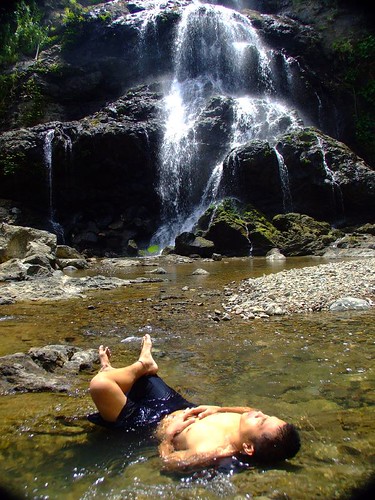
Real, Quezon, it is an adventure waiting to happen at your doorstep.
I wouldn't have suspected that I could simply catch a bus near my house and get off at a fishing village where falls, skin diving sites and endless beaches are mere walking distance from each other. I couldn't have known that in three hours, I would have been transported into a place where the pace of life was much slower yet overflowing with honest and down to earth smiles.
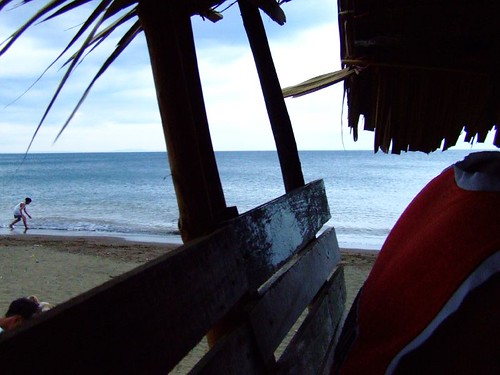
No Plans, No Idea
There is something appealing about having a backpack and not having a plan. I left home with only the knowledge that I was suppose to go to Quezon Province. Even that was indefinite until I got off the bus and found my foot planted firmly in Quezon soil.
From the bus station at Pasay, everything went by in a semi-conscious blur - I didn't even notice my home town Antipolo whiz by as we made our way through the province of Rizal. Next thing I know, I was getting off the bus still half-asleep and groggy. There to greet me was a brilliant sun dazzling my sleepiness away and a breeze coming from the shore blowing away the remnants of a dream from my eyes and replacing it with something much better. I knew it was going to be an interesting long weekend when I saw two men fixing a 12 meter pontoon at the side of the highway.
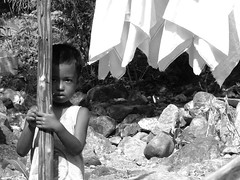 Soon enough, my traveling companion and I were greeted by our host at Imperial Beach Resort. When travel agencies pitch the Philippines to the world, they always made mention the hospitality of the Filipino. As locals, such a thing is a non-feature because a friendly smile and genuine concern for a traveler's welfare are common place - like chocolate in a chocolate factory. If it is not like that for the rest of the world then it must be such an unfriendly place outside these shores.
Soon enough, my traveling companion and I were greeted by our host at Imperial Beach Resort. When travel agencies pitch the Philippines to the world, they always made mention the hospitality of the Filipino. As locals, such a thing is a non-feature because a friendly smile and genuine concern for a traveler's welfare are common place - like chocolate in a chocolate factory. If it is not like that for the rest of the world then it must be such an unfriendly place outside these shores.
A Swig of Beer for Stories
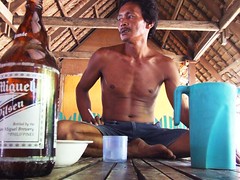 Hospitality equals beer. The moment my rear end touched the bench of a beach hut, a bottle of beer grande size was shoved right at my face. From there, the late morning was spent listening to tales from the ocean from fishermen stopping by our hut to take a swig of ice cold beer. For the price of a short glass, you will hear fishing tales from the vast Pacific, of shoals in the middle of the ocean where lobsters abound, of particular spots in the open ocean where every hour was spent battling with fishing lines, of 60kg yellow fin tuna and Marlins that can lurch boats. For another glass, you might hear of sad tragedies and still for another glass, you might be able to coerce funny tales about village characters and hilarious antics of locals from neighboring islands.
Hospitality equals beer. The moment my rear end touched the bench of a beach hut, a bottle of beer grande size was shoved right at my face. From there, the late morning was spent listening to tales from the ocean from fishermen stopping by our hut to take a swig of ice cold beer. For the price of a short glass, you will hear fishing tales from the vast Pacific, of shoals in the middle of the ocean where lobsters abound, of particular spots in the open ocean where every hour was spent battling with fishing lines, of 60kg yellow fin tuna and Marlins that can lurch boats. For another glass, you might hear of sad tragedies and still for another glass, you might be able to coerce funny tales about village characters and hilarious antics of locals from neighboring islands.
We were joined by a fisherman who walked with a limp - which I later learned was called diver's stagger. His story was that he was rushed to shore unconscious, having suffered from the bends - a condition where dissolved nitrogen in the blood comes out of solution and forms air bubbles in the bloodstream due to quick ascents or depressurization. He was liberal in making known his displeasure of his numb leg. Midway his short glass of beer, he slapped his lazy leg and said it was holding him back and that if it gets in the way any further then he might consider chopping it off.
It never occurred to me that there were different ways to fish. Small scale fishermen on one-man outriggers would trace the shore about a kilometer out to sea and cast their nets for smaller catch. Medium scale fishing boats would go out to sea for weeks, sometimes traveling all the way to Palawan. The fishing boats meant for the open waters of the Pacific were larger and generally fish for Yellow Fin Tuna, Marlin and other large catch using fishing lines. There are other boats that are equipped with compressors and these are the interesting ones as they are for spear fishermen.
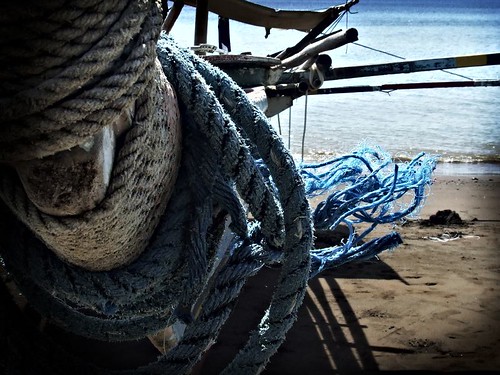
It was hard for me to imagine how spear fishing in the ocean was done until we swam out to one of these specialized outriggers and with our own eyes saw the equipment that they carry. The compressor sat below deck mid ship. From it radiated four thin and clear hoses that are about as thick as an average person's pinky. It would be a fair guess to say that unraveled, each hose would extend 50 meters. At their ends was a stiff tube secured with rubber strips. We were careful not to kink, step on or even touch these neatly spun hoses for one look and we immediately knew what depended on them.
Spear fishermen would go down depths with these tubes as lifelines. They would bite at the stiff tube at the ends to secure their lifeline in their mouths to breathe as they go about hunting for fish with their harpoons way below the water's surface. If you think the activity is risky, you're not mistaken. The fisherman who had the diver's stagger was and still is a spear fisherman. Tragic stories abound but out of respect and perhaps to distance themselves from the same fate, fishermen are hesitant to speak of them.
Siesta over; let's walk
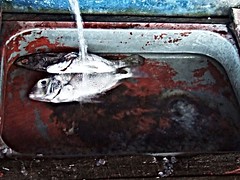 Noontime came and gone like the bottles of beer and platters of seafood dishes that were brought before us. Though the stories were entertaining and awe-inspiring, there will come a time when you will feel saturated by expectations and think of nothing but grabbing your things and hitting the road to see for yourself.
Noontime came and gone like the bottles of beer and platters of seafood dishes that were brought before us. Though the stories were entertaining and awe-inspiring, there will come a time when you will feel saturated by expectations and think of nothing but grabbing your things and hitting the road to see for yourself.
To ensure our safety and to act as guides, four young locals accompanied us on our excursion. The only remuneration that they expected was to share our meals as friends and to tag along and find an excuse to revisit the palces that they themselves love.
Walking, it is the only way to travel. To feel the hot pavement on the soles of your feet is to absorb the character of a place into your soul. Each window that you pass and inadvertently peek into is a split-second revelation that builds upon your understanding of a way of life you would never have known or imagine if you stayed within the confines of your car.
You must tread past the line of thicket on the side of the road to be able to tip a hat, ask to pass through their property, and exchange pleasantries with a family composed of three generations of fishermen and their overlapping families.
If the shore whizzes past as you traverse the coastal road in a car, how can you chance upon children learning the ways of the sea and profiting from it with their harpoons'
I walk because I know that the way of life that I crane my neck out to see behind these curtained windows will soon disappear. I know that the harpoons and goggles that the children there carry in their hands to play with will soon be replaced by culturally and socially irrelevant plastic robot dinosaur toys. Soon the only songs that will be sung will be irrelevant to their values and way of life.
Lunok Falls
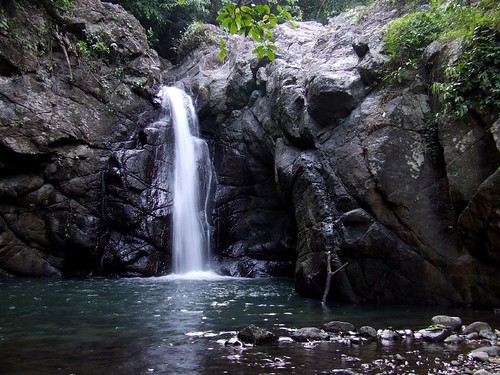
Lunok Falls is five minutes by foot from the side of Real-Mauban Coastal Road. The short trail is marked by a group of structures perhaps meant a long time ago as accommodation or amenities for tourists but since then had seemed largely unused.
We were greeted at the falls by families picnicking and around 10 children clambering up the sheer and slippery walls of the falls to dive bomb into the seven-foot deep pool. Middle aged women sat around together at the path of the rushing water while men of different ages sat at the shore sharing lambanog - a local distilled spirit derived from the sap of unopened coconut flowers.
Lunok Falls was beautiful and enticing to look at. Plunging more than twenty feet, it made a fine and inviting rumble. The volume of water draining from the mountains and out into this falls was fairly light allowing swimmers to easily brave bathing underneath the falling water.
Walking past the group of men, natagayan ako (I was offered a shot glass full of lambanog). These gestures can be likened to a handshake - it will be terribly rude for a person to reject the friendly offer. So down the hatch it went and I returned the greasy shot glass with a smile. After a few exchanges I bid them farewell and began clambering up an 18-foot near-vertical rock wall with my camera slung across my chest.
While my climbing buddy and our guides prepared late lunch, I intended to explore upstream to take some photographs of the flora and perhaps fauna and other sights along the banks.
Beyond Lunok was a series of lesser falls. To trace the flow of the stream, I had to hug rock faces and do minor bouldering to get to the other side of deep pools. Because of the camera, my progress was very slow. Apart from taking photographs, I had to be very sure of my handholds and footing lest I fall into the deep pools. I wouldn't mind getting wet but I doubt my digital camera shares the same sentiment.
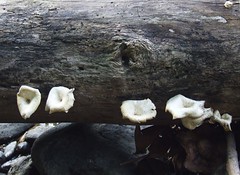 It doesn't seem that people frequent the areas I've gone to because the available handholds had thick layers of spider webs and the route through the boulder walls were full of debris. I often daintily slapped and brushed off debris from my handholds fearing I might squish a fat spider or some other arthropod and slip from the slime or naked terror that this might cause.
It doesn't seem that people frequent the areas I've gone to because the available handholds had thick layers of spider webs and the route through the boulder walls were full of debris. I often daintily slapped and brushed off debris from my handholds fearing I might squish a fat spider or some other arthropod and slip from the slime or naked terror that this might cause.
Soon enough I was faced by cascades with vertical rock faces on either side, somewhat like a small canyon. The water exits into a wide and deep pool which barred me from continuing any further.
Shoal Soul Searching
Back at camp, squids the size of a grown man's upper arm were roasting above a fire and the fish stew was steaming and spreading its delectable aroma all throughout the campsite. By then we had the campsite to ourselves except for a large uwak or crow jumping from one tree branch to another curiously observing us, and a cat sitting across the stream with an intent eye at our pot of fish.
The open area by the pool of the falls looked like a perfect place to set camp during the night, but our companions thought otherwise. According to them, nikniks - nasty biting insects with an insatiable appetite for blood, congregate at the banks of the Falls in the evening.
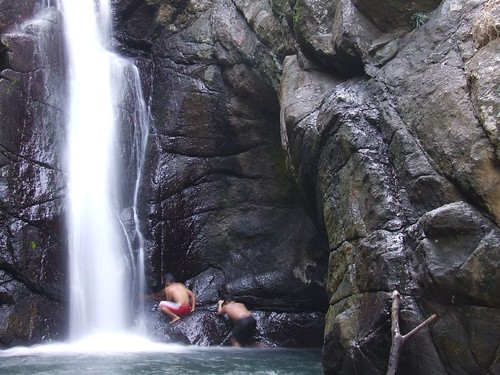
After swimming, dive bombing and eating, we gathered our things and made our way back to the Coastal Road, crossed to the other side and sauntered down the shore. The shoreline in these parts were covered with pebbles of different shades of gray and blue with some displaying streaks of green and red. The pebbles were large and looked like - for lack of anything better to compare it with - dinosaur eggs.
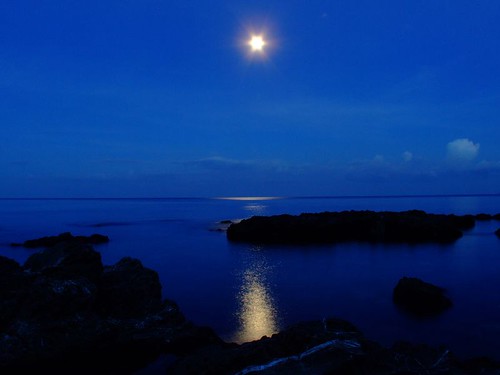
In the dying light, we made camp on a clump of pine trees growing on a flattened coral bed. Our campsite resembles in texture, color and smell, the rough outside of an oyster shell. A light colored material formed a crisscross relief on the blackish surface. Though the surface is even, it is sharp and walking barefoot was a difficult undertaking.
After setting up my tent, I went about stringing a hammock between two pine trees. With my feet off the ground and my face staring at the darkening sky through the bristly needles of pine trees, I came to thinking about the stories being told by our companions who had lived all their lives by the sea.
The sea was their universe. They may speak of politics and things going on in Manila but all these things were spoken with indifference. What lit their eyes up and gave a smile to their voices was talk of the sea, of her bounty, of far away islands with brilliant white sandy beaches, of leaving shore before dawn and spear fishing with only the light of the moon as bait.
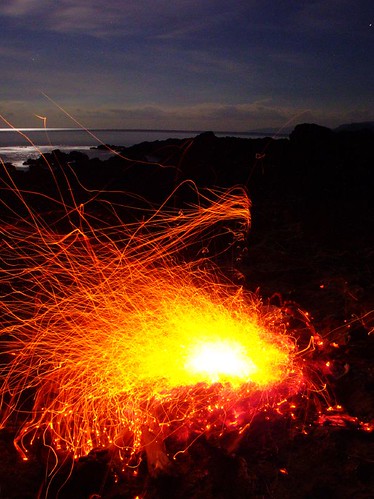
It was difficult for me to see the world through their eyes. It was difficult for me to shake off the immediacy and demands of urban living and the superficial, transient and personally irrelevant concerns that define it. It was hard for me to see the sea the way they do but I tried nonetheless and found that I might almost be able to grasp it between the undulation that the darkened world made while I lay still in my hammock.
In the easy cool humming of the sea, with our sleepy faces lit like ghosts by the bluish moon, I chanced upon a feeling of oneness with everything around me. It is at that instance when I let myself go at the edge of sleep that I felt the vastness of the universe embrace my fragile body. It is then that I lost all desire.
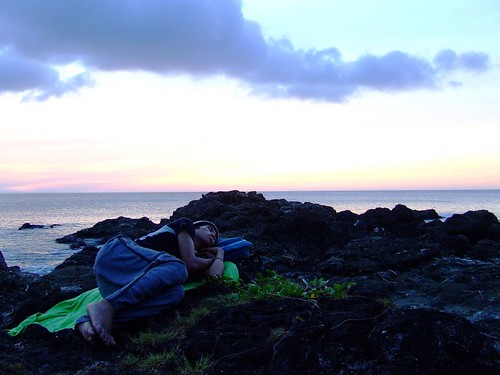
It was an eerie lesson in succumbing to fate, of succumbing to a form of soft death. For that brief moment before my consciousness fell into darkness, I saw the brilliance of the blackened sea and yet I didn't desire to own her or know more of her. Curiosity had left me and I stared out knowingly into the horizon like a child does to his mother's eyes. At that brief moment, I understood everything that needed to be understood and cared not for what I didn't understand.
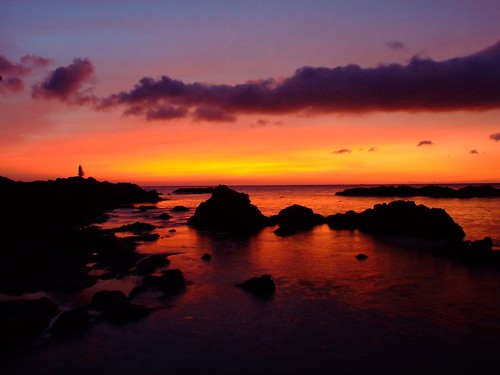
Dawn
I woke up in a place that was briefly unrecognizable. Most of the shoreline features I had taken note of at dusk became submerged at dawn. The vantage points where I planned to catch the early rays of the sun were no longer there.
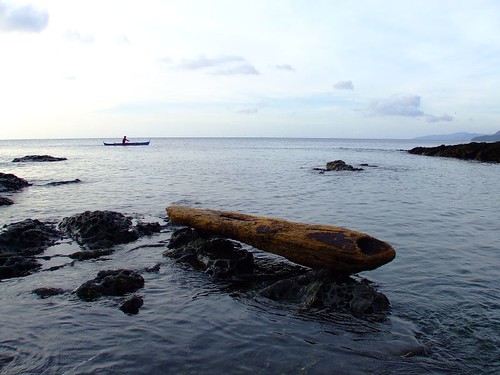
It was tricky to walk around the submerged sections of the shoal at dawn's muted light. Knee deep areas would abruptly end in 12-meter drop offs into the ocean floor. Seemingly secured knobs of rocks would turn out to be pillars of corals with a base submerged more than 5 meters underwater.
Peering into the dark deep blue, I can make out silver specks hovering then streaking into the darkness below. Fishes! They'd dart in and out of the dark bodies of coral underneath with some getting swept into the shallows where they'd skim across the thin water and plop right back into the ocean.
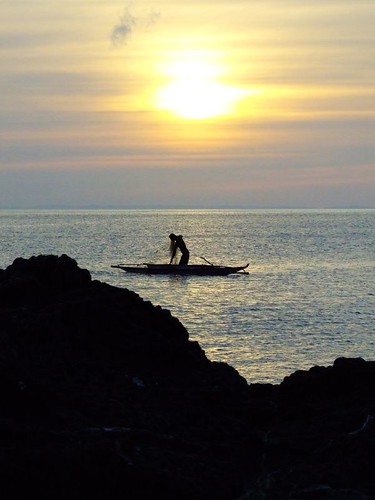
Dawn was a spectacular show of pink and yellow streaks in a foreground of deep blue and muted green. It was at the edge of the shoal that I sat witness to how nature could paint in her canvass the passing of time.
Fluid Dynamics
After a quick breakfast, we donned on our skimpy-dipping gear and with our sandals dove feet first into the warm morning water. Starting from the pebble-strewn shallows, we slowly but systematically swam out towards the heads of corals sticking out of the surface of the water. The sandals were such a good idea because everything that we can step on or hold was sharp. I came out of the water with a few deep cuts on my fingers from simply holding on a coral and then being nudged by a gentle wave. That was all it took to draw blood.
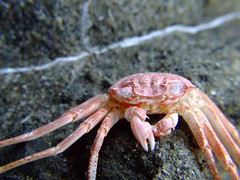 Though peppered with coral heads sticking out of the water, the ocean beneath us was deep - deep enough that even our young fishermen companions couldn't dive to touch the bottom. Perhaps to excuse himself, one of them said it was possible to reach the bottom but there were too many sharp obstructions below. It would be pretty risky to go that deep without a breathing apparatus and no idea on the currents. It will be easy to get swept into the maze of coral columns and get wedged underneath.
Though peppered with coral heads sticking out of the water, the ocean beneath us was deep - deep enough that even our young fishermen companions couldn't dive to touch the bottom. Perhaps to excuse himself, one of them said it was possible to reach the bottom but there were too many sharp obstructions below. It would be pretty risky to go that deep without a breathing apparatus and no idea on the currents. It will be easy to get swept into the maze of coral columns and get wedged underneath.
We were an interesting sight. A group of four men seemingly standing on something big and submerged in the ocean, crouching with our nose centimeters from the water peering into the deep. We stood there at the edge of an underwater cliff. No one brought goggles and the only way to see clearly what was beneath the surface was to bring our eyes as close to the surface of the water as possible. Even with such crude techniques, we could see the columns where we were standing on disappear into the deep.
We stared awe-struck at the spanning fans and other large structures of corals sticking out from the depths. Striped fishes, yellow flat bodied fishes, long silvery fishes darted in and out of view underneath. My companion even swore that he saw Nemo (a term used by city dwellers when they see a striped orange fish) which had all of us peering intently at the direction he pointed out. No Nemo but there were a number of Doris look-alike hovering in and around the area.
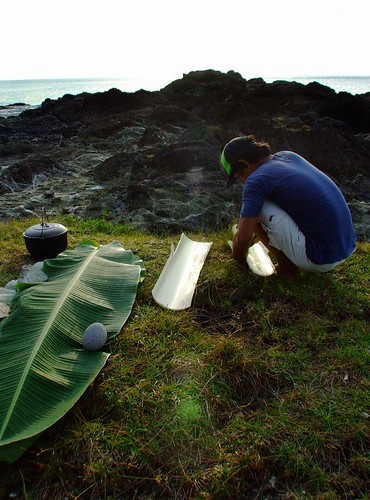
All morning long, we launched ourselves from the top of one coral column to another crossing the deep divide with much exhilaration, stopping every now and then to peer intently with our noses centimeters from the surface at an interesting underwater feature.
It was apparent that there was not enough time in a day to explore and see all that can be seen at the shoals. We had to fight the impulse 'to just go over there one last time and see what's underneath'. It helped to pull ourselves away from our coral hopping to know that our next stop was a multi-layered falls of staggering beauty.
Leap of Faith
We retraced our steps along the Real-Mauban Coastal Road to get to our next destination. The glassy surface of the sea, the shore and shoals were sparkling and shimmering from the intense glare of the noonday sun. If not for these visual indulgence, I could swear that the five-kilometer march was as close to torture as it can get. The road was dusty, hot, and blindingly bright and offered no shade to those traversing it.
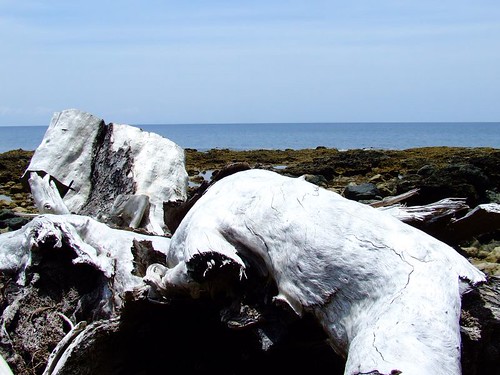
A large group of around 80 riders on scooters of varying size and style passed us by in a swirling cloud of dust and exhaust fumes. It is a popular weekend activity for Manila scooter enthusiasts and riders to crisscross the Laguna and Quezon countryside via Antipolo or Tanay. This route is popular to scooter riders because they are prohibited from the North Luzon and South Luzon Expressways leading out to the countryside due to their machines' small engine displacement. This is probably the reason why during long weekends, Laguna, Quezon and Aurora become swamped by riders.
A small store marked the unassuming turnoff into Balagbag Falls. Unfortunately, the falls was within private property and a small fee will be collected upon entry. The owners had taken the liberty in converting the lower portion of the falls into a resort of sorts as well as providing basic amenities like picnic huts, running tap water and a pair of toilets. A narrow concrete path leads to but terminates a good 20 meters from main pool's edge. I was appreciative that the developer had not installed any permanent concrete structures near the falls as this would certainly destroy the natural beauty of the place. Sensibly, the concrete path and toilets are out of sight from the main pool area. Often, sites like these end up being peppered with tacky concrete structures like imitation wood huts, and paths which in turn were often painted pink or bright green.
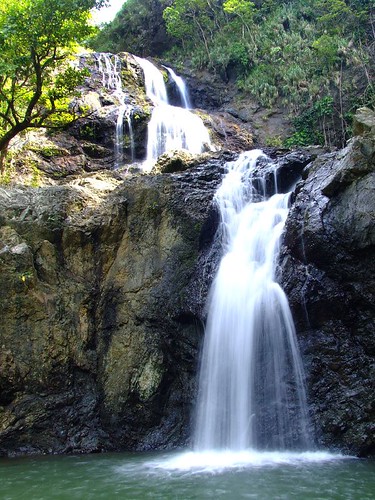
The first time I saw the multi-layered falls, I dropped my gear at the water's edge and clumsily brought out my camera as if what I was photographing was ephemeral and would be gone that very second. It was an impulse grounded on disbelief that such a sight could be beheld. I've been to many places and many a times was disappointed by the discrepancy between the stories told and what was actually there. When locals talk of Balagbag Falls, they'd describe it as maganda or beautiful and simply brush the topic aside. Clearly, I had underestimated what I thought to be behind the river's bend.
The manner in which the water fell was poetry. Like a playful but careless child, it hurled itself from the edge, before breaking apart into thousands of white flightless birds filling cracks and crevices before crashing into a state of languid abandonment as it snaked past self-possessed boulders before once again convening for a finale - a thundering crescendo! The spectacle was concluded with a denouement of faint chatter as the spent water trickle in a wide lineament towards the sea.
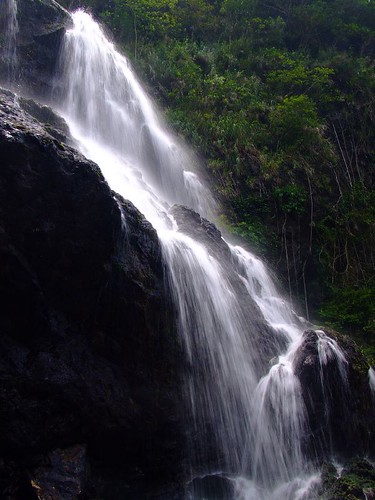
While being an observer has its advantage, being a participant was definitely more fulfilling. It didn't take long before we all found ourselves hurtling our fragile bodies over the fall's edge and into the deep blue green water of the pool below. What added to the thrill was that the deepest part of the pool was a mere eight feet deep. After hurtling ourselves over the edge in reckless abandon a few times, our arms soon became numb and bruised from hitting the water to break our fall.
My friend thought it was a good idea to raise his arms to avoid the impact of the water. Apparently, that wasn't such a wise move because it made his body cut an arching path through the water causing him to scrape his back at the pool's pebble strewn bottom. He ended up with ghastly but amusing half-bleeding scratches along his back With newfound knowledge on what not to do, we continued hurtling ourselves over the edge, challenging gravity and the shallow bottom of the pool. As for our half-bleeding friend, he decided to cook the day's meal instead.
Soon enough, we all lay flaccid by the shore of the pool savoring the moment and allowing the throbbing pain in our arms to ease. A group of youngsters from the area decided to show us a thing or two on how to catch some really mean airs. I watched them in utter amazement as they snubbed the place where we have launched ourselves and made their way towards a large tree with upper branches hanging directly over the center of the pool. To get to the upper branches, the boys would have to crawl up and along the narrow trunk, past sharp rocks and boulders around three stories below them.
Even as a spectator, I could sense the caution and hesitation in the boys' measured movements. As they cautiously crouched and secured themselves on the top most branches, I could see that they were about to jump a height that was double what my companions and I had jumped. When I realized this, blood drained from my face.
Two and a half seconds of deafening silence followed when a boy dropped from the branches. Time stood still. Whatever thought you might have in that span of time would be blown away by the loud deep crack that the diver's slippers made when it hit the surface of the water.
Bayanihan and a Slice of Fish
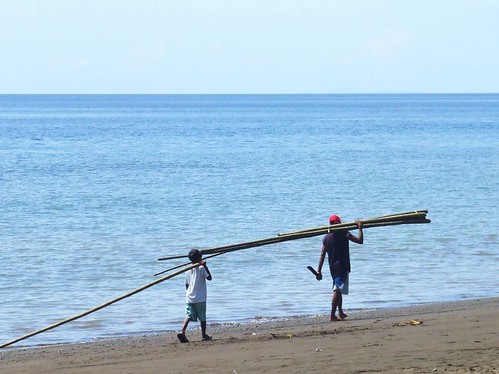
There are many places that I have been to which I didn't want to leave at first. To put things in perspective though, I always keep in mind that leaving is a good thing because it provided endless opportunities to arrive. So, with a smile on my face and a light heart to boot, I turned by back on Balagbag Falls, grateful for being an audience to her poetry and a dive-bomber to her rough edges.
Back at Imperial Beach Resort, the usual bottle of beer grande size greeted us, as well as a multitude of riders and cyclists looking for accommodations before nightfall.
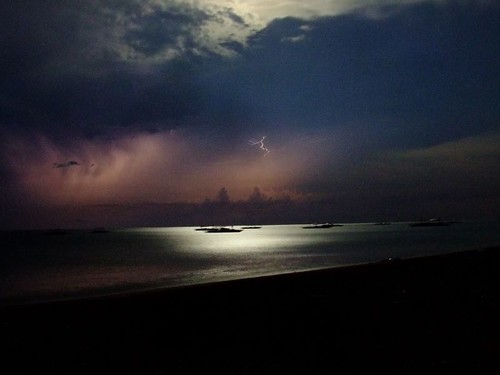
Soon enough, the length of beach was enlivened by drunken singing and all sorts of merriment while rain clouds gather just offshore. It was a fine night to string up a hammock and sleep facing the sea. The merry ruckus seem to be holding the rain back, but not enough to hold back the wind from disheveling our hair and stirring up sand.
Morning had an aftertaste of normalcy as the festive aura of the long weekend left with the departing riders and cyclist. People had begun to revert to their daily chores and responsibilities. As I hauled a big fat tire interior towards the water, I watched men doing maintenance work on the haul of their outriggers while others coiled ropes, lines and arranged line sinkers and other supplies on smaller outriggers to ferry on their waiting vessels anchored just offshore.
The water was very warm; the kind of temperature you'd expect from a spa. Further out, the water became a confused layering of warm and cold currents. The large difference in temperature enabled you to distinctly feel and sense the currents. Never had I used my skin to consciously objectify my surroundings. It felt like being given a new sense - something to know my surroundings by. And what a way to enjoy such a newfound sense: lying on an outrigger's pontoon, feeling the bands of warm and cold currents on my thighs and calf while riding the rise and dips of a peaceful ocean, soaking in the sun, sound and sights.
As I bobbed a fair distance from the shore, I took in the sight of the village as it lay sprawled along the beach while low mountain ridges backed the shimmering scene. It got me thinking about events earlier that morning when an outrigger returned after two weeks out at sea. The community came out in force to welcome it. You'd think that after seeing a thousand and one of these arrivals everyone would have gotten used to it; but not here. When people greet the arrival of a boat, their intentions run deeper than curiosity.
The crew and their onshore counterparts laid out wood as thick and round as a grown man's calf in a rail crosstie pattern up the beach. The outrigger aligned itself near the shore and powered itself up onto the wooden rail to beach itself. Young and old, women and men, took up their positions at the lateral framework supporting the boats pontoons. With the heavy beams resting on their shoulders, they heaved in unison at the egging of a crew member.
'Isa...dalawa...tatlo!' (One...two...three!). On three, everyone heaved and the outrigger slid up a few feet up the wooden crossties. The woods left behind are brought up front hurriedly. After allowing everyone to catch their breaths, the crew begins again, 'Isa...dalawa...tatlo! Tulak!' The boat was heavy and we struggled as our feet dug into the sand the moment we heaved. Sand stung our eyes and rubbed painfully between our exposed shoulders and the wooden beams of the boat.
The power of the community working together was awesome. We could feel it as the heavy outrigger made its way up the beach. The collective elation in fulfilling a communal task was overpowering. Everyone was smiling and laughing at the effort and a job well done.
Immediately, a crew member signaled everyone to gather near the boat and they handed out sliced tuna about the size of an open palm. There were many to go around and the children had a field day. My friend and I were a bit at a lost at this turn of events and we gingerly stepped back and out of the way of everyone. Our hesitation was felt by a crew member and he walked up to us with two slices of fish and motioned us to take them. Everyone was telling us to get the fish and the learned reaction of first refusing any offer seem so wrong at that moment that we felt we had no choice but to accept.
After giving away fish, the crew started work in hauling out their catch. From below deck emerged fishes the length of a grown person. Children filled the deck and clung to beams and post trying to catch a glimpse of shimmering giant sea creatures.
Tout sinewy men took the giant fishes on their shoulders with their fingers on the fishes' eye sockets for grip. With much heaving, they brought the catch to a waiting vehicle that will take them to Navotas - a central port in Metro Manila where fishes are auctioned off or sold wholesale.
I don' wanna go home!
The rest of the day was spent soaking in the sun, sights and smell of the place, in anticipation of our departure later in the evening. We swam out from one anchored boat to another, taking in the details of these crafts to deduce the boats function and imagine the activities that would have gone on above deck when they were out at sea.
We also helped in pushing an outrigger back into the water - though obviously that didn't yield any fish for us but it gave us a strong and powerful sense of belonging.
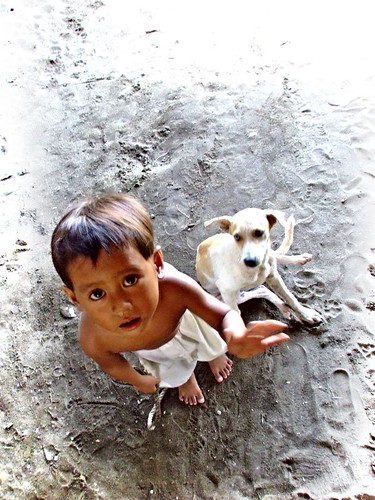
It was an idyllic end to a long weekend, loafing along the shore, lying on a hammock not minding the sand covering most of my thighs and torso, watching children play and adults do their tasks, listening to outriggers chug along towards the bright horizon.
Evening came and it was time for us to depart. To return to the hustle and bustle, all one had to do was step onto the side of the road and wait for the next bus.
It was odd to feel like a stranger to this place all of a sudden. The mere act of preparing to leave had eroded that strong sense of community that we felt while we shared beer with fishermen, when we helped to haul that outrigger onto shore, while we looked out for children playing in the water.
Without that commitment in being depended upon by the community to work, share and care about the welfare of everyone, you become just like the countless faceless nameless persons who pass by the highway cutting through their village.
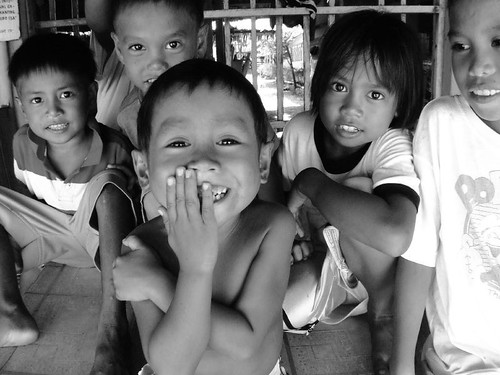
The anomic existence of urban life has drawn our consciousness away from this place the moment we began to worry about our offices and deadlines. Before we even lay our foot on the first metal step of the bus, we had already arrived in the city.
Though our minds were already engrossed with future tasks and schedules, I think we left our souls straddling the bow of an outrigger, riding the ebb and rise of the gentle ocean of Real, Quezon.
How to get there and what will it take?
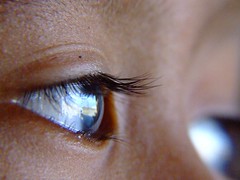 All it takes is a bus ride.
All it takes is a bus ride.
Meet at Pureza Station of the Light Rail Transit 2. Alternatively, ask to be dropped off underneath the Nagtahan Bridge at the side going to Recto. Find your way towards Raymond Bus Line station. Depending on your preferred schedule, you may opt to wait for the next trip to Real, Quezon, or catch a ride on the vans for hire that are parked along the side of the road.
Ask to be dropped off at Imperial Beach Resort, Tignoan, Real, Quezon. Drivers and conductors are mostly familiar with the names of the private beaches along the village and it is common for people to request to be informed of their stop. Of course, there are other beaches with adequate facilities along the Mahaba Highway. Some resorts will allow you to pitch your tents at the beach or string your hammock at the open air cottages so long as you rent at least one cottage.
The cost of a long weekend trip will vary depending on your appetite for seafood and preference in sleeping arrangements. At a minimum, around Php 1,500.00 per person will go a long way to cover most everything you need for an exciting and eventful long weekend. If you happen to be a beer or lambanog guzzler, or someone with a biblical appetite for seafood, then you may have to bring more cash.
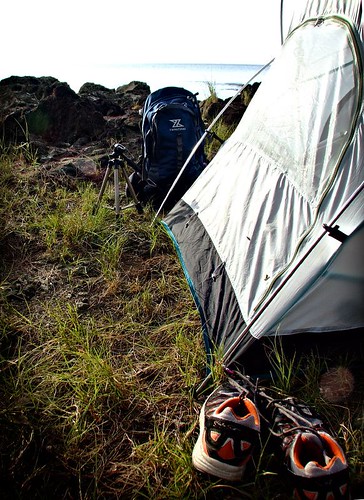
June 13, 2006

Real, Quezon, it is an adventure waiting to happen at your doorstep.
I wouldn't have suspected that I could simply catch a bus near my house and get off at a fishing village where falls, skin diving sites and endless beaches are mere walking distance from each other. I couldn't have known that in three hours, I would have been transported into a place where the pace of life was much slower yet overflowing with honest and down to earth smiles.

No Plans, No Idea
There is something appealing about having a backpack and not having a plan. I left home with only the knowledge that I was suppose to go to Quezon Province. Even that was indefinite until I got off the bus and found my foot planted firmly in Quezon soil.
From the bus station at Pasay, everything went by in a semi-conscious blur - I didn't even notice my home town Antipolo whiz by as we made our way through the province of Rizal. Next thing I know, I was getting off the bus still half-asleep and groggy. There to greet me was a brilliant sun dazzling my sleepiness away and a breeze coming from the shore blowing away the remnants of a dream from my eyes and replacing it with something much better. I knew it was going to be an interesting long weekend when I saw two men fixing a 12 meter pontoon at the side of the highway.
 Soon enough, my traveling companion and I were greeted by our host at Imperial Beach Resort. When travel agencies pitch the Philippines to the world, they always made mention the hospitality of the Filipino. As locals, such a thing is a non-feature because a friendly smile and genuine concern for a traveler's welfare are common place - like chocolate in a chocolate factory. If it is not like that for the rest of the world then it must be such an unfriendly place outside these shores.
Soon enough, my traveling companion and I were greeted by our host at Imperial Beach Resort. When travel agencies pitch the Philippines to the world, they always made mention the hospitality of the Filipino. As locals, such a thing is a non-feature because a friendly smile and genuine concern for a traveler's welfare are common place - like chocolate in a chocolate factory. If it is not like that for the rest of the world then it must be such an unfriendly place outside these shores.A Swig of Beer for Stories
 Hospitality equals beer. The moment my rear end touched the bench of a beach hut, a bottle of beer grande size was shoved right at my face. From there, the late morning was spent listening to tales from the ocean from fishermen stopping by our hut to take a swig of ice cold beer. For the price of a short glass, you will hear fishing tales from the vast Pacific, of shoals in the middle of the ocean where lobsters abound, of particular spots in the open ocean where every hour was spent battling with fishing lines, of 60kg yellow fin tuna and Marlins that can lurch boats. For another glass, you might hear of sad tragedies and still for another glass, you might be able to coerce funny tales about village characters and hilarious antics of locals from neighboring islands.
Hospitality equals beer. The moment my rear end touched the bench of a beach hut, a bottle of beer grande size was shoved right at my face. From there, the late morning was spent listening to tales from the ocean from fishermen stopping by our hut to take a swig of ice cold beer. For the price of a short glass, you will hear fishing tales from the vast Pacific, of shoals in the middle of the ocean where lobsters abound, of particular spots in the open ocean where every hour was spent battling with fishing lines, of 60kg yellow fin tuna and Marlins that can lurch boats. For another glass, you might hear of sad tragedies and still for another glass, you might be able to coerce funny tales about village characters and hilarious antics of locals from neighboring islands.We were joined by a fisherman who walked with a limp - which I later learned was called diver's stagger. His story was that he was rushed to shore unconscious, having suffered from the bends - a condition where dissolved nitrogen in the blood comes out of solution and forms air bubbles in the bloodstream due to quick ascents or depressurization. He was liberal in making known his displeasure of his numb leg. Midway his short glass of beer, he slapped his lazy leg and said it was holding him back and that if it gets in the way any further then he might consider chopping it off.
It never occurred to me that there were different ways to fish. Small scale fishermen on one-man outriggers would trace the shore about a kilometer out to sea and cast their nets for smaller catch. Medium scale fishing boats would go out to sea for weeks, sometimes traveling all the way to Palawan. The fishing boats meant for the open waters of the Pacific were larger and generally fish for Yellow Fin Tuna, Marlin and other large catch using fishing lines. There are other boats that are equipped with compressors and these are the interesting ones as they are for spear fishermen.

It was hard for me to imagine how spear fishing in the ocean was done until we swam out to one of these specialized outriggers and with our own eyes saw the equipment that they carry. The compressor sat below deck mid ship. From it radiated four thin and clear hoses that are about as thick as an average person's pinky. It would be a fair guess to say that unraveled, each hose would extend 50 meters. At their ends was a stiff tube secured with rubber strips. We were careful not to kink, step on or even touch these neatly spun hoses for one look and we immediately knew what depended on them.
Spear fishermen would go down depths with these tubes as lifelines. They would bite at the stiff tube at the ends to secure their lifeline in their mouths to breathe as they go about hunting for fish with their harpoons way below the water's surface. If you think the activity is risky, you're not mistaken. The fisherman who had the diver's stagger was and still is a spear fisherman. Tragic stories abound but out of respect and perhaps to distance themselves from the same fate, fishermen are hesitant to speak of them.
Siesta over; let's walk
 Noontime came and gone like the bottles of beer and platters of seafood dishes that were brought before us. Though the stories were entertaining and awe-inspiring, there will come a time when you will feel saturated by expectations and think of nothing but grabbing your things and hitting the road to see for yourself.
Noontime came and gone like the bottles of beer and platters of seafood dishes that were brought before us. Though the stories were entertaining and awe-inspiring, there will come a time when you will feel saturated by expectations and think of nothing but grabbing your things and hitting the road to see for yourself. To ensure our safety and to act as guides, four young locals accompanied us on our excursion. The only remuneration that they expected was to share our meals as friends and to tag along and find an excuse to revisit the palces that they themselves love.
Walking, it is the only way to travel. To feel the hot pavement on the soles of your feet is to absorb the character of a place into your soul. Each window that you pass and inadvertently peek into is a split-second revelation that builds upon your understanding of a way of life you would never have known or imagine if you stayed within the confines of your car.
You must tread past the line of thicket on the side of the road to be able to tip a hat, ask to pass through their property, and exchange pleasantries with a family composed of three generations of fishermen and their overlapping families.
If the shore whizzes past as you traverse the coastal road in a car, how can you chance upon children learning the ways of the sea and profiting from it with their harpoons'
I walk because I know that the way of life that I crane my neck out to see behind these curtained windows will soon disappear. I know that the harpoons and goggles that the children there carry in their hands to play with will soon be replaced by culturally and socially irrelevant plastic robot dinosaur toys. Soon the only songs that will be sung will be irrelevant to their values and way of life.
Lunok Falls

Lunok Falls is five minutes by foot from the side of Real-Mauban Coastal Road. The short trail is marked by a group of structures perhaps meant a long time ago as accommodation or amenities for tourists but since then had seemed largely unused.
We were greeted at the falls by families picnicking and around 10 children clambering up the sheer and slippery walls of the falls to dive bomb into the seven-foot deep pool. Middle aged women sat around together at the path of the rushing water while men of different ages sat at the shore sharing lambanog - a local distilled spirit derived from the sap of unopened coconut flowers.
Lunok Falls was beautiful and enticing to look at. Plunging more than twenty feet, it made a fine and inviting rumble. The volume of water draining from the mountains and out into this falls was fairly light allowing swimmers to easily brave bathing underneath the falling water.
Walking past the group of men, natagayan ako (I was offered a shot glass full of lambanog). These gestures can be likened to a handshake - it will be terribly rude for a person to reject the friendly offer. So down the hatch it went and I returned the greasy shot glass with a smile. After a few exchanges I bid them farewell and began clambering up an 18-foot near-vertical rock wall with my camera slung across my chest.
While my climbing buddy and our guides prepared late lunch, I intended to explore upstream to take some photographs of the flora and perhaps fauna and other sights along the banks.
Beyond Lunok was a series of lesser falls. To trace the flow of the stream, I had to hug rock faces and do minor bouldering to get to the other side of deep pools. Because of the camera, my progress was very slow. Apart from taking photographs, I had to be very sure of my handholds and footing lest I fall into the deep pools. I wouldn't mind getting wet but I doubt my digital camera shares the same sentiment.
 It doesn't seem that people frequent the areas I've gone to because the available handholds had thick layers of spider webs and the route through the boulder walls were full of debris. I often daintily slapped and brushed off debris from my handholds fearing I might squish a fat spider or some other arthropod and slip from the slime or naked terror that this might cause.
It doesn't seem that people frequent the areas I've gone to because the available handholds had thick layers of spider webs and the route through the boulder walls were full of debris. I often daintily slapped and brushed off debris from my handholds fearing I might squish a fat spider or some other arthropod and slip from the slime or naked terror that this might cause.Soon enough I was faced by cascades with vertical rock faces on either side, somewhat like a small canyon. The water exits into a wide and deep pool which barred me from continuing any further.
Shoal Soul Searching
Back at camp, squids the size of a grown man's upper arm were roasting above a fire and the fish stew was steaming and spreading its delectable aroma all throughout the campsite. By then we had the campsite to ourselves except for a large uwak or crow jumping from one tree branch to another curiously observing us, and a cat sitting across the stream with an intent eye at our pot of fish.
The open area by the pool of the falls looked like a perfect place to set camp during the night, but our companions thought otherwise. According to them, nikniks - nasty biting insects with an insatiable appetite for blood, congregate at the banks of the Falls in the evening.

After swimming, dive bombing and eating, we gathered our things and made our way back to the Coastal Road, crossed to the other side and sauntered down the shore. The shoreline in these parts were covered with pebbles of different shades of gray and blue with some displaying streaks of green and red. The pebbles were large and looked like - for lack of anything better to compare it with - dinosaur eggs.

In the dying light, we made camp on a clump of pine trees growing on a flattened coral bed. Our campsite resembles in texture, color and smell, the rough outside of an oyster shell. A light colored material formed a crisscross relief on the blackish surface. Though the surface is even, it is sharp and walking barefoot was a difficult undertaking.
After setting up my tent, I went about stringing a hammock between two pine trees. With my feet off the ground and my face staring at the darkening sky through the bristly needles of pine trees, I came to thinking about the stories being told by our companions who had lived all their lives by the sea.
The sea was their universe. They may speak of politics and things going on in Manila but all these things were spoken with indifference. What lit their eyes up and gave a smile to their voices was talk of the sea, of her bounty, of far away islands with brilliant white sandy beaches, of leaving shore before dawn and spear fishing with only the light of the moon as bait.

It was difficult for me to see the world through their eyes. It was difficult for me to shake off the immediacy and demands of urban living and the superficial, transient and personally irrelevant concerns that define it. It was hard for me to see the sea the way they do but I tried nonetheless and found that I might almost be able to grasp it between the undulation that the darkened world made while I lay still in my hammock.
In the easy cool humming of the sea, with our sleepy faces lit like ghosts by the bluish moon, I chanced upon a feeling of oneness with everything around me. It is at that instance when I let myself go at the edge of sleep that I felt the vastness of the universe embrace my fragile body. It is then that I lost all desire.

It was an eerie lesson in succumbing to fate, of succumbing to a form of soft death. For that brief moment before my consciousness fell into darkness, I saw the brilliance of the blackened sea and yet I didn't desire to own her or know more of her. Curiosity had left me and I stared out knowingly into the horizon like a child does to his mother's eyes. At that brief moment, I understood everything that needed to be understood and cared not for what I didn't understand.

Dawn
I woke up in a place that was briefly unrecognizable. Most of the shoreline features I had taken note of at dusk became submerged at dawn. The vantage points where I planned to catch the early rays of the sun were no longer there.

It was tricky to walk around the submerged sections of the shoal at dawn's muted light. Knee deep areas would abruptly end in 12-meter drop offs into the ocean floor. Seemingly secured knobs of rocks would turn out to be pillars of corals with a base submerged more than 5 meters underwater.
Peering into the dark deep blue, I can make out silver specks hovering then streaking into the darkness below. Fishes! They'd dart in and out of the dark bodies of coral underneath with some getting swept into the shallows where they'd skim across the thin water and plop right back into the ocean.

Dawn was a spectacular show of pink and yellow streaks in a foreground of deep blue and muted green. It was at the edge of the shoal that I sat witness to how nature could paint in her canvass the passing of time.
Fluid Dynamics
After a quick breakfast, we donned on our skimpy-dipping gear and with our sandals dove feet first into the warm morning water. Starting from the pebble-strewn shallows, we slowly but systematically swam out towards the heads of corals sticking out of the surface of the water. The sandals were such a good idea because everything that we can step on or hold was sharp. I came out of the water with a few deep cuts on my fingers from simply holding on a coral and then being nudged by a gentle wave. That was all it took to draw blood.
 Though peppered with coral heads sticking out of the water, the ocean beneath us was deep - deep enough that even our young fishermen companions couldn't dive to touch the bottom. Perhaps to excuse himself, one of them said it was possible to reach the bottom but there were too many sharp obstructions below. It would be pretty risky to go that deep without a breathing apparatus and no idea on the currents. It will be easy to get swept into the maze of coral columns and get wedged underneath.
Though peppered with coral heads sticking out of the water, the ocean beneath us was deep - deep enough that even our young fishermen companions couldn't dive to touch the bottom. Perhaps to excuse himself, one of them said it was possible to reach the bottom but there were too many sharp obstructions below. It would be pretty risky to go that deep without a breathing apparatus and no idea on the currents. It will be easy to get swept into the maze of coral columns and get wedged underneath. We were an interesting sight. A group of four men seemingly standing on something big and submerged in the ocean, crouching with our nose centimeters from the water peering into the deep. We stood there at the edge of an underwater cliff. No one brought goggles and the only way to see clearly what was beneath the surface was to bring our eyes as close to the surface of the water as possible. Even with such crude techniques, we could see the columns where we were standing on disappear into the deep.
We stared awe-struck at the spanning fans and other large structures of corals sticking out from the depths. Striped fishes, yellow flat bodied fishes, long silvery fishes darted in and out of view underneath. My companion even swore that he saw Nemo (a term used by city dwellers when they see a striped orange fish) which had all of us peering intently at the direction he pointed out. No Nemo but there were a number of Doris look-alike hovering in and around the area.

All morning long, we launched ourselves from the top of one coral column to another crossing the deep divide with much exhilaration, stopping every now and then to peer intently with our noses centimeters from the surface at an interesting underwater feature.
It was apparent that there was not enough time in a day to explore and see all that can be seen at the shoals. We had to fight the impulse 'to just go over there one last time and see what's underneath'. It helped to pull ourselves away from our coral hopping to know that our next stop was a multi-layered falls of staggering beauty.
Leap of Faith
We retraced our steps along the Real-Mauban Coastal Road to get to our next destination. The glassy surface of the sea, the shore and shoals were sparkling and shimmering from the intense glare of the noonday sun. If not for these visual indulgence, I could swear that the five-kilometer march was as close to torture as it can get. The road was dusty, hot, and blindingly bright and offered no shade to those traversing it.

A large group of around 80 riders on scooters of varying size and style passed us by in a swirling cloud of dust and exhaust fumes. It is a popular weekend activity for Manila scooter enthusiasts and riders to crisscross the Laguna and Quezon countryside via Antipolo or Tanay. This route is popular to scooter riders because they are prohibited from the North Luzon and South Luzon Expressways leading out to the countryside due to their machines' small engine displacement. This is probably the reason why during long weekends, Laguna, Quezon and Aurora become swamped by riders.
A small store marked the unassuming turnoff into Balagbag Falls. Unfortunately, the falls was within private property and a small fee will be collected upon entry. The owners had taken the liberty in converting the lower portion of the falls into a resort of sorts as well as providing basic amenities like picnic huts, running tap water and a pair of toilets. A narrow concrete path leads to but terminates a good 20 meters from main pool's edge. I was appreciative that the developer had not installed any permanent concrete structures near the falls as this would certainly destroy the natural beauty of the place. Sensibly, the concrete path and toilets are out of sight from the main pool area. Often, sites like these end up being peppered with tacky concrete structures like imitation wood huts, and paths which in turn were often painted pink or bright green.

The first time I saw the multi-layered falls, I dropped my gear at the water's edge and clumsily brought out my camera as if what I was photographing was ephemeral and would be gone that very second. It was an impulse grounded on disbelief that such a sight could be beheld. I've been to many places and many a times was disappointed by the discrepancy between the stories told and what was actually there. When locals talk of Balagbag Falls, they'd describe it as maganda or beautiful and simply brush the topic aside. Clearly, I had underestimated what I thought to be behind the river's bend.
The manner in which the water fell was poetry. Like a playful but careless child, it hurled itself from the edge, before breaking apart into thousands of white flightless birds filling cracks and crevices before crashing into a state of languid abandonment as it snaked past self-possessed boulders before once again convening for a finale - a thundering crescendo! The spectacle was concluded with a denouement of faint chatter as the spent water trickle in a wide lineament towards the sea.

While being an observer has its advantage, being a participant was definitely more fulfilling. It didn't take long before we all found ourselves hurtling our fragile bodies over the fall's edge and into the deep blue green water of the pool below. What added to the thrill was that the deepest part of the pool was a mere eight feet deep. After hurtling ourselves over the edge in reckless abandon a few times, our arms soon became numb and bruised from hitting the water to break our fall.
My friend thought it was a good idea to raise his arms to avoid the impact of the water. Apparently, that wasn't such a wise move because it made his body cut an arching path through the water causing him to scrape his back at the pool's pebble strewn bottom. He ended up with ghastly but amusing half-bleeding scratches along his back With newfound knowledge on what not to do, we continued hurtling ourselves over the edge, challenging gravity and the shallow bottom of the pool. As for our half-bleeding friend, he decided to cook the day's meal instead.
Soon enough, we all lay flaccid by the shore of the pool savoring the moment and allowing the throbbing pain in our arms to ease. A group of youngsters from the area decided to show us a thing or two on how to catch some really mean airs. I watched them in utter amazement as they snubbed the place where we have launched ourselves and made their way towards a large tree with upper branches hanging directly over the center of the pool. To get to the upper branches, the boys would have to crawl up and along the narrow trunk, past sharp rocks and boulders around three stories below them.
Even as a spectator, I could sense the caution and hesitation in the boys' measured movements. As they cautiously crouched and secured themselves on the top most branches, I could see that they were about to jump a height that was double what my companions and I had jumped. When I realized this, blood drained from my face.
Two and a half seconds of deafening silence followed when a boy dropped from the branches. Time stood still. Whatever thought you might have in that span of time would be blown away by the loud deep crack that the diver's slippers made when it hit the surface of the water.
Bayanihan and a Slice of Fish

There are many places that I have been to which I didn't want to leave at first. To put things in perspective though, I always keep in mind that leaving is a good thing because it provided endless opportunities to arrive. So, with a smile on my face and a light heart to boot, I turned by back on Balagbag Falls, grateful for being an audience to her poetry and a dive-bomber to her rough edges.
Back at Imperial Beach Resort, the usual bottle of beer grande size greeted us, as well as a multitude of riders and cyclists looking for accommodations before nightfall.

Soon enough, the length of beach was enlivened by drunken singing and all sorts of merriment while rain clouds gather just offshore. It was a fine night to string up a hammock and sleep facing the sea. The merry ruckus seem to be holding the rain back, but not enough to hold back the wind from disheveling our hair and stirring up sand.
Morning had an aftertaste of normalcy as the festive aura of the long weekend left with the departing riders and cyclist. People had begun to revert to their daily chores and responsibilities. As I hauled a big fat tire interior towards the water, I watched men doing maintenance work on the haul of their outriggers while others coiled ropes, lines and arranged line sinkers and other supplies on smaller outriggers to ferry on their waiting vessels anchored just offshore.
The water was very warm; the kind of temperature you'd expect from a spa. Further out, the water became a confused layering of warm and cold currents. The large difference in temperature enabled you to distinctly feel and sense the currents. Never had I used my skin to consciously objectify my surroundings. It felt like being given a new sense - something to know my surroundings by. And what a way to enjoy such a newfound sense: lying on an outrigger's pontoon, feeling the bands of warm and cold currents on my thighs and calf while riding the rise and dips of a peaceful ocean, soaking in the sun, sound and sights.
As I bobbed a fair distance from the shore, I took in the sight of the village as it lay sprawled along the beach while low mountain ridges backed the shimmering scene. It got me thinking about events earlier that morning when an outrigger returned after two weeks out at sea. The community came out in force to welcome it. You'd think that after seeing a thousand and one of these arrivals everyone would have gotten used to it; but not here. When people greet the arrival of a boat, their intentions run deeper than curiosity.
The crew and their onshore counterparts laid out wood as thick and round as a grown man's calf in a rail crosstie pattern up the beach. The outrigger aligned itself near the shore and powered itself up onto the wooden rail to beach itself. Young and old, women and men, took up their positions at the lateral framework supporting the boats pontoons. With the heavy beams resting on their shoulders, they heaved in unison at the egging of a crew member.
'Isa...dalawa...tatlo!' (One...two...three!). On three, everyone heaved and the outrigger slid up a few feet up the wooden crossties. The woods left behind are brought up front hurriedly. After allowing everyone to catch their breaths, the crew begins again, 'Isa...dalawa...tatlo! Tulak!' The boat was heavy and we struggled as our feet dug into the sand the moment we heaved. Sand stung our eyes and rubbed painfully between our exposed shoulders and the wooden beams of the boat.
The power of the community working together was awesome. We could feel it as the heavy outrigger made its way up the beach. The collective elation in fulfilling a communal task was overpowering. Everyone was smiling and laughing at the effort and a job well done.
Immediately, a crew member signaled everyone to gather near the boat and they handed out sliced tuna about the size of an open palm. There were many to go around and the children had a field day. My friend and I were a bit at a lost at this turn of events and we gingerly stepped back and out of the way of everyone. Our hesitation was felt by a crew member and he walked up to us with two slices of fish and motioned us to take them. Everyone was telling us to get the fish and the learned reaction of first refusing any offer seem so wrong at that moment that we felt we had no choice but to accept.
After giving away fish, the crew started work in hauling out their catch. From below deck emerged fishes the length of a grown person. Children filled the deck and clung to beams and post trying to catch a glimpse of shimmering giant sea creatures.
Tout sinewy men took the giant fishes on their shoulders with their fingers on the fishes' eye sockets for grip. With much heaving, they brought the catch to a waiting vehicle that will take them to Navotas - a central port in Metro Manila where fishes are auctioned off or sold wholesale.
I don' wanna go home!
The rest of the day was spent soaking in the sun, sights and smell of the place, in anticipation of our departure later in the evening. We swam out from one anchored boat to another, taking in the details of these crafts to deduce the boats function and imagine the activities that would have gone on above deck when they were out at sea.
We also helped in pushing an outrigger back into the water - though obviously that didn't yield any fish for us but it gave us a strong and powerful sense of belonging.

It was an idyllic end to a long weekend, loafing along the shore, lying on a hammock not minding the sand covering most of my thighs and torso, watching children play and adults do their tasks, listening to outriggers chug along towards the bright horizon.
Evening came and it was time for us to depart. To return to the hustle and bustle, all one had to do was step onto the side of the road and wait for the next bus.
It was odd to feel like a stranger to this place all of a sudden. The mere act of preparing to leave had eroded that strong sense of community that we felt while we shared beer with fishermen, when we helped to haul that outrigger onto shore, while we looked out for children playing in the water.
Without that commitment in being depended upon by the community to work, share and care about the welfare of everyone, you become just like the countless faceless nameless persons who pass by the highway cutting through their village.

The anomic existence of urban life has drawn our consciousness away from this place the moment we began to worry about our offices and deadlines. Before we even lay our foot on the first metal step of the bus, we had already arrived in the city.
Though our minds were already engrossed with future tasks and schedules, I think we left our souls straddling the bow of an outrigger, riding the ebb and rise of the gentle ocean of Real, Quezon.
How to get there and what will it take?
 All it takes is a bus ride.
All it takes is a bus ride. Meet at Pureza Station of the Light Rail Transit 2. Alternatively, ask to be dropped off underneath the Nagtahan Bridge at the side going to Recto. Find your way towards Raymond Bus Line station. Depending on your preferred schedule, you may opt to wait for the next trip to Real, Quezon, or catch a ride on the vans for hire that are parked along the side of the road.
Ask to be dropped off at Imperial Beach Resort, Tignoan, Real, Quezon. Drivers and conductors are mostly familiar with the names of the private beaches along the village and it is common for people to request to be informed of their stop. Of course, there are other beaches with adequate facilities along the Mahaba Highway. Some resorts will allow you to pitch your tents at the beach or string your hammock at the open air cottages so long as you rent at least one cottage.
The cost of a long weekend trip will vary depending on your appetite for seafood and preference in sleeping arrangements. At a minimum, around Php 1,500.00 per person will go a long way to cover most everything you need for an exciting and eventful long weekend. If you happen to be a beer or lambanog guzzler, or someone with a biblical appetite for seafood, then you may have to bring more cash.

Some rights reserved. No part of this post may be reproduced in any printed material of commercial purpose without the express consent of the author.









